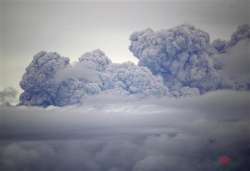Ash From Chile Volcano Grounds Flights
Rininahue, Chile, Jun 11 : Steaming rivers filled with hot ash, rocks, and rain threatened to overflow their banks in southern Chile on Friday and ash clouds from a volcano that began erupting nearly a

Rininahue, Chile, Jun 11 : Steaming rivers filled with hot ash, rocks, and rain threatened to overflow their banks in southern Chile on Friday and ash clouds from a volcano that began erupting nearly a week ago kept some airports closed across much of the southern part of the continent.
In towns bordering the Cordon Caulle volcano, authorities warned that rivers were about to flood due to the large amounts of ash and volcanic rock that have fallen in them and heavy rains that have doused the area of southern Chile.
About 3,500 residents had been evacuated, and 500 of them were still in shelters Friday. Authorities were seeking legal permission Friday to evacuate a dozen more who refused to leave their property and animals behind.
The flow of the Nilahue and GolGol rivers near the volcano had increased from 1,000 cubic feet per second to 5,600 cubic feet per second, Chilean Public Works Minister Hernan de Solminihac said on state television Friday.
"It's important that people leave their homes for their own security, because the volcano has not ceased to erupt," he said.
Tons of hot volcanic material had raised the temperature of the River Nilahue to 45 degrees Celsius, killing off large numbers of salmon, Solminihac said. The average air temperature this time of year in the region is about 10 degrees Celsius.
Residents of the Argentine capital, Buenos Aires, and the neighboring Uruguayan capital of Montevideo, awakened Friday to ash-covered streets, sidewalks and automobiles.
And some who tried to leave found airports closed because of the clouds of fine grit that can damage airplane engines.
Argentina's civil aviation authorities reopened Buenos Aires' two main airports on Friday once the cloud of ash moved away. Other smaller Argentine airports to the south and in Patagonia remained closed.
Numerous flights in Brazil, Chile and Uruguay also were canceled as a precaution. Authorities in Uruguay were considering a possible reopening of the international airport in Montevideo.
The volcano, which began erupting last Saturday, has also affected winter resorts in southern Argentina's Patagonia region, including San Carlos Bariloche, Villa La Angostura, San Martin de los Andes and Esquel.
The Southern Hemisphere's winter begins on June 21, and resort operators are concerned that a prolonged eruption could keep away tourists.
In San Carlos de Bariloche, more than 65 percent of the nearly 4.5 billion pesos ($1 billion) collected by businesses comes in the three winter months, according to government statistics from 2010. About 250,000 tourists arrive each year in the city, which is more than 1,650 kilometers southwest of Buenos Aires.
Workers in the resort city filled 600 dump trucks Thursday with the ash that had fallen on the airport's main runway. Officials have said that the airport would be closed at least until June 21.